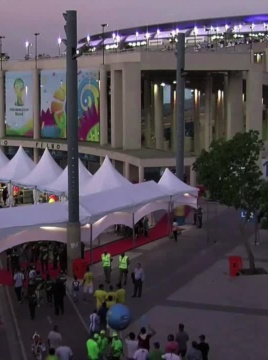Mixed Opinions About World Cup Impact on Brazilian Economy
RIO DE JANEIRO — As fans enjoy football’s (soccer’s) month-long World Cup, Brazilian authorities are pleased over the boost they say the tournament is giving the country's economy. However, independent analysts who study such mega-events are less enthusiastic.
The 2014 World Cup has injected an estimated $15 billion into the Brazilian economy and created many jobs, this according to the head of the government’s Embratur tourism board, Vicente Neto at a news conference June 19.
“Regarding the human legacy, the numbers are extraordinary: the creation of one million jobs in the country due to this great event, one million jobs or 15 percent of all the jobs created this year in Brazil,” he said.
 |
The government has invested $11 billion in stadiums and infrastructure and another $2 billion in security. It is expected to spend billions more preparing for the 2016 Olympic games in Rio.
But an analyst who studies such mega-events, Architecture and Urbanism Professor at Rio de Janeiro’s Fluminense Federal University, Chris Gaffney, believes these figures are exaggerated.
“I don’t think that they’ve invested enough money to create those kinds of permanent jobs. In the scale of the Brazilian economy we’re not looking at that much money being invested. It’s 30 billion [dollars invested] in a $1 trillion economy.”
Another expert, Lisa Delpy Neirotti of George Washington University's business school in the United States, says the real economic benefits of such events are less tangible and more long-term.
“There’s a lot of transfer of knowledge," she said. "People are learning more about hospitality. There’s also the broadcast center where they’re being trained in how to use technology. And so I think it’s in the media sector, a lot in the hospitality industry and also in licensing and merchandizing, retail.”
Gaffney believes the money being spent benefits very few Brazilians.
“The World Cup and Olympics are part of an extractive business model that moves around the world very freely, a top-down business model that uses the interests of local political and economic elites to make money for international corporations,” he said.
Delpy Neirotti disagrees.
“Yes, there’s been a lot of money spent here but we have to realize that the infrastructure that they’ve built up around the World Cup is something that will last and it stays in the country,” she said.
Other analysts say the Cup may help the Brazilian economy but it also boosts inflation and public debt. Less than half of the Brazilians in a recent poll believed that hosting the Cup was a good idea.
And there have been many demonstrations against the Cup, though they have declined since the tournament began.
Nevertheless, many Brazilians are proud to host the World Cup and the 600,000 foreign visitors it brings. The hope is that they will spread the good word about Brazil when they return home.







